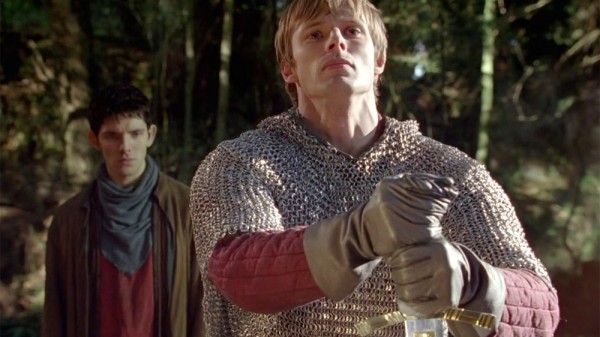Normally, I’m not a TV kind of person. I prefer books, and the longer the better! True storytelling is what I love, and in a time where narrative culture is more and more determined by the length of a Twitter message, the spinning of a grand old-fashioned tale has become a rare thing on television.
Such a rare exception was the BBC series Merlin – until it was announced late in 2012 that the show wouldn’t be continued after the end of Series 5. When I read that in an interview, my first thought was that it seemed quite a daunting task, if not even an impossible one, to tie up all the loose threads that were glaringly left hanging about in the few episodes that were left, let alone to provide the series with an ending that would remain faithful to its trademark genial tone, and live up to all the expectations that had been raised over the years by constantly reminding us that it was Merlin’s destiny to build Camelot’s Golden Age with Arthur and return the magic to the land.
Sadly, my apprehensions turned out to be justified. The evening of the Merlin finale – Christmas Eve, of all things! – left me sitting stunned in front of my TV, tears streaming down my face, only vaguely aware what had just happened to me, although it occurred to me what it was later that night: emotional trauma at the hands of a television series! Ever since then I have been searching the internet for Merlin related sites like this one, where I could voice my disappointment and outrage at how this series I loved was ended: much too rushed, without real closure, sporting at least one gaping plot hole (the fact that Merlin dragged the gravely injured Arthur all over Albion on horseback instead of calling Kilgharrah to help immediately), leaving many storylines unexplored and the main promise, that of Camelot’s Golden Age – implying a new level in the Merlin/Arthur relationship, with a fully recognized Merlin finally being on equal footing with Arthur, getting credit for his deeds at last, and their friendship being renewed and strengthened so they’ll be able build the new Camelot – remaining unfulfilled.
At this point, I’d like to stress that I’m no giggling fangirl. I’m a 39-year-old English teacher from Germany, mother of four (who all love Merlin just as much as I do, if not more), and freelance writer. For me this is not about “Merthur” swooning – I leave that to my daughter – but the blossoming friendship between the prince and his servant is undeniably one of the high points of the show, even the force that gives it momentum, an incredibly sweet, innocent, and touching bond of brotherhood that we can relate to on a basic human level. I firmly believe that it was this fusion of a timeless tale of true friendship with one of most famous and fascinating subject matters of the Western literary canon, transforming it into a story that allows glimpses of the familiar Arthurian legend while developing a strong and original take on it, that struck a chord with viewers around the globe.
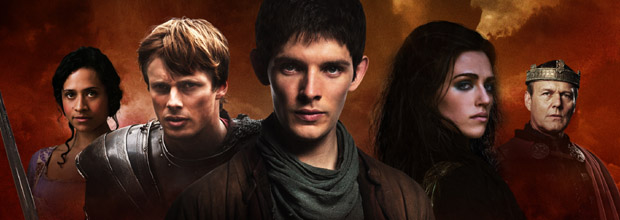
When I stumbled upon Merlin, I was immediately intrigued, and never have missed an episode since. I also bought the German DVD editions so my children could watch them with me. At first I was convinced that I liked the show for its many obvious endearing features – the simply told stories, the teasing banter between prince and servant, the young cast’s sheer enthusiasm, the epic fights against evil witches and magical beasts, so beautifully and tastefully rendered, in short, its classic fantasy setting. But soon I realized that for me – and apparently for many others too, as the numerous blog entries and forum posts throughout the internet show – that beyond this heroic, romantic surface there was much more to it than that.
Merlin has resonated deeply with my imagination. This series, which cheerily disguised itself as a lighthearted family show, in truth explored the archetypal leitmotifs of European literature, and of human nature itself, within a charming and enthralling fantasy frame that made it easy and a fun experience to follow these explorations. Honour, love, duty, friendship, betrayal, the rocky relationship between fathers and sons, the attempt to live up to a destiny one did not choose, being torn between different loyalties, the demons that wait to be fought every day, all these are basic human concepts that are still as valid and important today as they were when the medieval and Renaissance authors wrote their Arthurian romances.
Granted, Merlin was first and foremost intended as a fun fantasy drama, and rightly so, as it is one of the very few TV series that can be watched and enjoyed by the whole family, without falling flat for the older generation. But while my children fell for Merlin’s perfect sword-and-sorcery approach, with its gorgeous costumes, lots of magic, dragons, classic villains, and beautiful, sometimes ethereal settings, it was the characters’ confrontation with the pitfalls of human nature and their consequent development, conveyed so brilliantly by the cast’s outstanding performance, what really caught my attention.
Ever since J.R.R. Tolkien laid down the basic framework and rules that have shaped the fantasy genre, it has been clear that the true magic of a good fantasy story is never to be found in the magical power that is wielded – or the Dark Lords of the trade would always triumph. The true magic in fantasy lies, in fact, in the heroes’ strength of character, their courage, their perseverance in the face of insurmountable difficulty, and in the friendship and love that prompts them to their brave deeds. It’s no coincidence that the great fantasy champions are more often than not simple people whom fate puts in a position they haven’t actively sought out, unlikely heroes who, as J.K. Rowling put it in Harry Potter and the Deathly Hallows, “take up the mantle because they must, and find to their own surprise that they wear it well”.
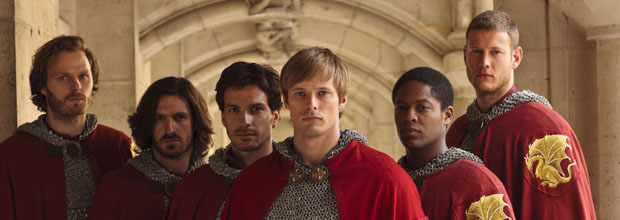
In precisely this spirit, the series made Arthur and Merlin young contemporaries rather than an old Merlin being advisor to a young king Arthur, which probably was its most important and ingenious diversion from the Arthurian sources, because this plot device allows us the pleasure of getting to know our heroes before they have fully come into their own. Notwithstanding his astonishing magical powers, Merlin appears as a simple peasant boy who wears his heart on his sleeve and whose refusal to be daunted by rank or physical superiority is constantly getting him into trouble; Prince Arthur is already a skilled warrior and courageous knight when we meet him, but as yet lacking such virtues as modesty or consideration for others, hiding his deep-rooted fear of not being able to live up to his father’s high expectations behind a tough “save-the-world” attitude, as Gwen phrases it when she first talks to Merlin.
Although we know from earlier takes on the legend what kind of men Merlin and Arthur will grow into, Merlin portrays them as young boys who have yet to overcome their only too human flaws, who are not legendary yet but still have a great deal to learn. Following Arthur’s progress from somewhat self-centred, secretly insecure and pampered “prat” to truly kingly material, and Merlin’s transformation from naïve prodigy-cum-country bumpkin into the wise and powerful but unswervingly compassionate mage who’s invisibly pulling all the strings from behind his humble disguise was pure joy. By embarking with them on their journey to legendary status, we began to care deeply about them as characters, and became emotionally involved in their classic coming-of-age story.
As much as we enjoyed the ever present tease of Merlin’s magic being eventually discovered (a moment we all simultaneously dreaded and yearned for), it was the development of Merlin’s and Arthur’s characters, and of their unlikely friendship, which cast the true spell of Merlin and made soon seem the many turrets of beautiful Pierrefonds Castle as the legendary Camelot feel like home to everyone who accompanied the heroes on their weekly adventures. As we followed the progress of this friendship, feeling sorry for Merlin’s ordeals, being angry at Arthur’s unfairness, rejoicing when it became obvious that the duo had started trusting each other with their lives, we were drawn into the age-old questions of human nature they had to deal with as the events unfolded, and drawn into the legend itself.
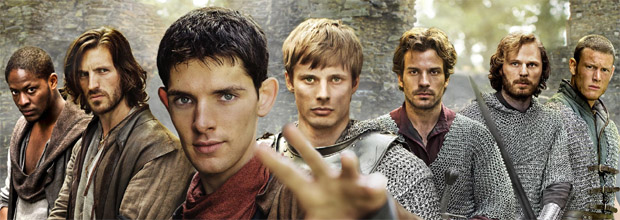
There has never been any TV series, movie, or book before where the ending has left me so heartbroken, and which such a sense of having been cheated by the authors. It was, simply, wrong, and what is really tragic is that it didn’t have to be like that, not even if it was important to the authors to stay “true to legend” – which is in itself impossible, as there is no such thing as “the” legend where Arthurian writing is concerned. For literally a thousand years, from 12th century historian Geoffrey of Monmouth (to whom the Merlin writers tipped their hat by assigning him a permanent cameo role in the series as a grumpy court librarian of the same name), to Renaissance writer Thomas Malory, and finally to modern fantasy authors like T.H. White and Marion Zimmer Bradley, the king and his sorcerer have inspired writers throughout the Western world to use the existing material and do with it whatever they wanted, depending on their respective time, their targeted audience and intentions.
There is not a single other subject matter in the history of European literature that had such an impact or inspired such a sheer mass of writing, both in prose and poetry and in every major European language, than the story of King Arthur and the knights of the round table. None of the Arthurian authors ever had any scruples at all to employ poetic licence whenever it suited their needs. From the very beginning, the Arthurian cycle has been a legend in progress. Obviously, the Merlin writers were aware of this practice and have employed it themselves countless times throughout the series.
It was always fun to meet a well-known character in a way that differed slightly or, in many cases, greatly from the other familiar versions of the story, and find out how they would eventually “get there”: Guinevere is a serving girl?! But wasn’t she supposed to be the queen? – Lancelot is such a nice guy, and Gwen could never betray Arthur, so how do we reach their legendary betrayal?! – Merlin is supposed to be a Gandalf-style old man with long white hair and a beard, not a young guy, so why do the legends describe him as old?! The series played with our preconceived notions about the legend, and brought them home to us with a twist. That was the secret that made the series so deliciously plot-driven in spite of the fact that the Arthurian plot has been known for centuries. And this, too, explains why its ending has been felt to be so upsetting and incongenial by so many fans.
What is truly jarring about the final episode of Merlin is not the fact that Arthur dies. Arthur’s death at the hands of the traitor Mordred has been a central motif since the beginning of Arthurian literature. Everyone who is familiar with Malory’s take on Arthuriana, or has read White’s The Once and Future King, knows that Arthur is, eventually, going to die, and that Camelot will perish. It’s the essentially British version of the biblical lament of “how are the mighty fallen”, and we wouldn’t really expect any Arthurian tale to change that.
What he indeed have come to expect from Merlin, however, is a respectful treatment of our beloved characters’ growth, and the above-mentioned plot twist that does justice to the characters while still capable of being seen in accordance with legend. These two concepts have, time and again, formed the backbone of countless Merlin episodes, but tragically the final one, which should by rights have revelled in every aspect that made Merlin the series it had become, failed miserably on both counts.
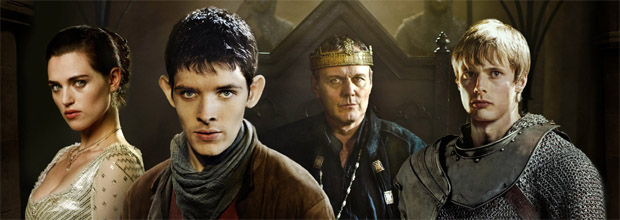
While the eagerly anticipated magic reveal, though something of let-down where plot is concerned (why come out now, when innocent lives could have been saved by doing so much earlier?), was a beautiful and heart-rending piece of acting – so kudos to Colin Morgan and Bradley James for their amazing achievement – and while Arthur’s gradual acceptance of Merlin’s true nature was everything fans had been hoping for, it came much too late, and robbed us of the chance to see Merlin recognized by the whole of Camelot as the world’s greatest sorcerer at last, and, above all, accepted and respected by Arthur for what he is.
That was what their beautiful friendship had promised us, and what we felt was due to us, and when looking at the ancient sources, and taking note of the explicit loopholes provided there – Geoffrey of Monmouth, for instance, says nothing about Arthur actually dying, but states that he was just “mortally wounded” and brought to Avalon to be “healed” – it seems a complete mystery to me why the writers of Merlin insisted on killing Arthur off before any of the great deeds the series kept alluding to had been accomplished, when they could easily have employed one of their trademark plot twists to devise an ending where Arthur would still eventually meet his doom in Mordred, yet gets to build the legendary Golden Age of Camelot with a fully revealed Merlin at his side.
Of course, it would not be easy for Merlin’s creators to renounce the ending they decided on. I imagine that every creative artist feels honour-bound to stand by his creation once it is accomplished, I understand that, and I wouldn’t presume to even begin to know the circumstances in which the decision was made to end Merlin, and end it the way it has, but given the points I stated above it is obvious for everyone with eyes to see that it can’t possibly have been the ending the writers originally envisioned. As the recurring popularity and constant reinvention of Arthurian legend shows, existing versions don’t have to be set in stone like Excalibur. An obviously wrong ending, stemming maybe from a temporary error in artistic judgement, can be revised.
It’s not even necessary to go back on it. There are dramaturgical devices available to deal with episode 5×13, after all – make it a dream, make it a vision in the Crystal Cave, a prophecy of what will happen if Merlin doesn’t take action at once! I want to appeal to the outstanding, inventive writers and producers of Merlin to rethink their decision to end the series, because, in Merlin’s words, “Some choices are easy. Some stay with you forever.” Please, don’t let the choices you made in ‘The Diamond of the Day’ stay with you forever!
I am aware that it is much to hope for, but I for one won’t give up on the dream that there will indeed be a Series 6, or a miniseries, or even a film with the same cast and characters who brought the legend home to us, so that destiny can be fulfilled, magic returned to the land, and Kilgharrah’s words about Emrys not having failed what he set out to do will finally come true. But whether it will come to pass or not, in my heart I know, as surely do all the Merlinians around the world, that this is not the end to Arthur’s and Merlin’s story.
Their legend lives on. We will remember them. We would just rather do it by watching a brand-new Merlin episode that, this time round, does justice to its own creative goals and intentions.
Do you think Merlin should return? Let us know below…

